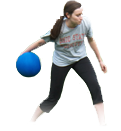
Barefoot Running Style – A better way to run?
If you are familiar with my training regiment then you know that distance running is just not part of my routine. I am just not a fan of anything much over a 5K. Now I hope I do not offend all of you runners out there. If you like to run have at it, it is just not my thing. I find it monotonous and personally feel the health benefits of long distance running are not worth the risks. During my day at the Arena District Athletic Club, I speak with a lot of avid runners and there is one common theme that I hear – my knees hurt, I have this sharp pain in my hip, my chins are killing me, hmmm, now I am no doctor but if you are experiencing these kinds of symptoms then something wrong. The question is what? It could be several things such as overtraining, poor mechanics and or a muscle imbalance. So what is the right way to run?
Recently there has been a lot of attention given to “barefoot” running. There has been a growing body of research suggesting that the midfoot strike running style humans intuitively use when they run barefoot has an evolutionary and biomechanical advantage over the traditional style of landing on the heels. Translation: Running barefoot is more efficient. And makes you a stronger runner!
Just about every shoe manufacture has gotten on board with this trend, developing shoes that replicate the motion and feel of barefoot running. When most people wear traditional running shoes they tend to hold their body in a vertical position while focusing on generating push-off propulsion and landing on the sneakers’ heavily cushioned heels. Barefoot running advocates say this heel striking is like flooring an accelerator then screeching to a halt with every stride causing the body to have to absorb a tremendous impact on the hip and knee joints. They prefer the midfoot running style, tilting their bodies forward, and landing on the fleshy part of the midfoot where the metatarsals disperse the shock of impact primarily through the muscles causing less impact on the joints.
Preliminary studies on this barefoot-style of running seem promising, suggesting that it could lower chances of ankle and lower leg injuries, and even help to conserve energy. But the research is far from conclusive. Most of the data is based on runners in developing countries and in labs, neither of which directly correlates to the running most of us are used to.
Now if you have been running using a traditional stride and you are not experiencing any problems, altering your stride could result in injury. If you plan on switching to a barefoot style of running do so gradually. Reduce your mileage until you get use to it and perfect your technique. For those of you who long to run pain free miles this just may be the answer you’ve been looking for.




